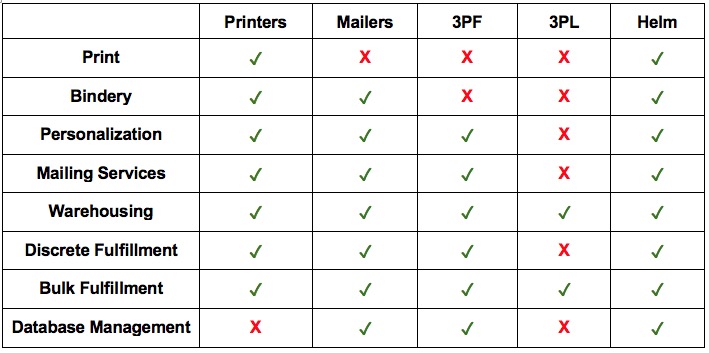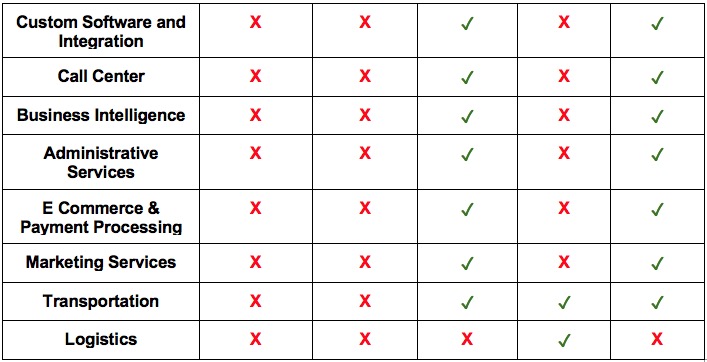

Although used interchangeably, 3rd party online fulfillment (3PF) companies and third-party logistics (3PL) have very different purposes and intended outcomes.
When looking to partner with companies who can
help them effortlessly source and ship orders, many corporate businesses assume
that third-party logistics (3PL) is the natural fit. What they may then realize
is that they are not looking for a logistics partner but rather a partner for
third-party fulfillment. Then, the business’s decision makers have to wonder:
“What is it I really want? Is it just fulfillment? Is it 3PL? What’s the
difference between 3PF and 3PL, and why would I choose one over the other?”
These questions have complex answers,
especially since many in our industry use terms like “fulfillment services” and
“3PL” interchangeably. The root cause of this confusion lies in how third-party
logistics has become a genericized label for a whole range of services, most of
them actually falling in the “fulfillment” camp.
At their core, order fulfillment services and
3PL are quite separate. 3PF services oversee a much larger portion of the
supply chain, and they include services like eCommerce, marketing, and program
administrative support that are usually handled in-house. 3PF providers
essentially become an extension of your operations, allowing you to focus on
top-level strategy and growth while knowing confidently that every order will
be fulfilled as promised. 3PL, on the other hand, usually tasks you with all of
the back office duties while just managing the physical storage of inventory
and bulk freight shipment of your orders.
To help you further separate the two, we’ll
explain the difference between 3PF and 3PL through both succinct and in-depth
definitions.
Third party fulfillment handles every part of
the ordering process for the client. The most obvious and important component
of their service is ensuring product orders can reach their destination
quickly, reliably, consistently, without damage, and in a way that provides a
great experience to the end recipient. Fulfillment order recipients can include
anyone from franchise partners, peripheral corporate offices, retail partners,
or direct-to-consumer orders placed via ecommerce.
Unlike third-party logistics, the vast
majority of shipments made through a fulfillment service involve discrete
qualities of stock, time sensitivity, and highly variable order conditions.
There is rarely a single preferred turnkey process that figuratively railroads
your shipments into a preferred outcome. Instead, variable conditions and
unique challenges are the norm. Every order is a special order in fulfillment.
In addition to flexible shipping, fulfillment
services can also include:
●
Kitting and assembly for orders,
such as grouping whitelabel literature with items or packing subscription box
orders
●
Database management, which ensures
that inventory changes are documented and the proper people are notified when
an order is received, picked, and finally shipped
●
Variable data printing for
literature, whitelabel packaging, direct mail and recall campaigns, marketing
collateral, and other client needs
●
eCommerce website, mobile and
tablet design for product information, order placement, and payment processing
on behalf of the client
●
Order returns and recalls as well
as customer support
●
Other value-add services, which
can include administrative support, print services, best way shipping and more
●
Business intelligence across all
program disciplines, such as sales, inventory, and product trends
●
Strategic decision-making for the
most optimal supply chain process, such as selecting drop ship over
direct-to-consumer for certain order types
Third-party fulfillment services are also
customizable, meaning clients can pick and choose any or all of the bulleted
services above.
Like many other third-party fulfillment
companies, Helm provides additional value-add services outside these core
areas. We can also manage your entire fulfillment program, including
performance monitoring, budgetary management, peripheral marketing support and
more.
Think of 3PF as managing a large portion of
your ecommerce business for you. Consider how IT as-a-service models provide
complete technical support and oversight of systems. With this model, companies
don’t have to develop high-salary technical talent or create a department that
becomes a cost center. Similarly, third-party fulfillment means you can operate
your business without having to focus on using capital to invest in large
warehouse facilities, developing complex processes for non-core functions, or implementing expensive
technology with a lengthy ROI cycle.
As an extra benefit, the deep knowledge and
economies of scale 3PF provides can generally surpass even the most expertly
managed internal fulfillment programs. Third-party fulfillment companies like
Helm have a broader range of experience tackling unique challenges and meeting
highly variable demands, making us more prepared to consider every option
before implementing the optimal solutions.
By streamlining your operations and constantly
optimizing your fulfillment performance, Helm can help turn a typical cost
center into a profit center.
Third-party logistics services help businesses
distribute and ship goods in full truck load or container size shipments. 3PL
usually oversees multimodal inbound and outbound shipments via truck, rail, air
and ocean services. They specialize in arranging long-term shipping contracts
as well as order scheduling, routing, and optimal distribution arrangements to
ensure more consistent service to major hubs, ports, distribution centers and
other critical contact points along the supply chain.
Unlike 3PF, where order conditions can be
highly variable, 3PL contracts generally aim to standardize shipment processes
as much as possible. If you were to ask a 3PL partner to arrange a one-time
shipment with 20 different kitted order arrangements, weighing under 10 pounds,
and shipped to 12 franchise locations, their most likely response would be a
resolute “no”.
Logistics generally does not handle direct
client interactions, nor is it capable of providing services like database
management, kitting & assembly, or white labelled custom packaging.
In other words: while fulfillment focuses on
the quality of individual orders and the adept management of client operations,
logistics looks at the big picture for large supply chains. Instead of worrying
about hundreds of diverse orders being routed through multiple carriers in
order to satisfy customers and business clients like fulfillment does,
logistics concerns itself with intermodal good transfers on a massive scale.
The table below illustrates the different services
offered by 3PL, 3PF and Helm’s own capabilities. As you can see, 3PF providers
cover a lot of ground, and Helm can offer even more.


To put the difference between 3PL and 3PF
succinctly: Third-party logistics has a narrower scope that mainly concerns
itself with arranging bulk freight orders across many methods of transportation
as part of huge, complex supply chain business networks. Third-party
fulfillment instead remains focused on processes and services that ensure
unique individual orders get fulfilled quickly and profitably to create a
repeatable experience that leads to satisfied end recipients.
By operating your order processing efficiently
and managing all aspects of the supply chain for you, third-party fulfillment
partners allow your business to scale quickly without encountering commonly
associated growth bottlenecks. Rather than worrying about developing order
fulfillment systems or acquiring expensive warehousing capital, you business
can simply focus on strengthening its brand and determining how to maximize
your promise of value to your customers, clients, and business partners.
Third-party logistics, on the other hand,
mostly only benefits businesses with generic, repeatable orders shipped via
freight.
At the end of the day, fulfillment is about
people feeling fulfilled and getting the order they needed. Logistics is about
routing trucks and creating repeatable processes with the aim of satisfying
operations managers and financial goals rather than any particular end
recipient.

For over 80 years, Helm has been helping brands enhance their appeal and inspire loyalty through our evolving set of unique, customizable, and client-focused services. Your brand is our passion.

For over 80 years, Helm has been helping brands enhance their appeal and inspire loyalty through our evolving set of unique, customizable, and client-focused services. Your brand is our passion.
